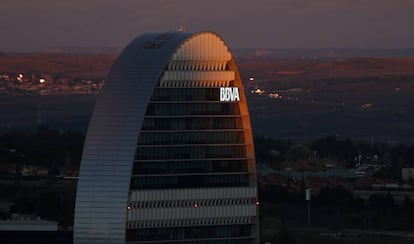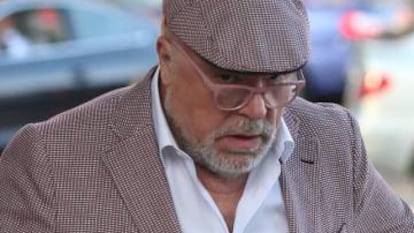Spain’s BBVA under formal investigation in vast spying case
The second-largest bank will be probed for bribery, disclosure of secrets and corruption as part of wider court proceedings against retired police chief José Manuel Villarejo

Spain’s second-largest bank, BBVA, has been placed under formal investigation by the country’s high court, the Audiencia Nacional, as part of a far-reaching spying probe known as the Villarejo case.
The case is named after José Manuel Villarejo, a former police commissioner who is at the heart of an espionage network spanning two decades’ worth of phone taps, undercover recordings and other invasions of privacy against scores of politicians, business leaders, judges and journalists.
As part of one of the 10 separate probes that make up the sprawling Villarejo case, High Court Judge Manuel García-Castellón has placed BBVA under investigation for alleged bribery, disclosure of secrets and corrupt business practices, in line with prosecutors’ requests.
The bank is thought to have employed the services of a company run by Villarejo to secretly spy on rivals and on officials from the construction giant Sacyr, which launched an unsuccessful takeover bid for BBVA in 2004.
Comisiones Obreras, the bank’s main union, has accused former chairman Francisco González of being “the main person responsible for the bank’s loss of reputation” and asked to sever “any formal ties” with him. The bank’s current chairman, Carlos Torres, said in a note that his priority is “to clear up the facts.”
A well-paid side gig

Former police commissioner José Manuel Villarejo allegedly ran a lucrative business on the side for years, selling sensitive information to wealthy clients as leverage against their rivals and enemies.
He apparently had a network of "moles" working for him at banks, telecommunications companies and even the Tax Agency; these employees provided him with phone records, bank accounts and tax returns containing confidential information about his own clients' targets.
Although he has been in pre-trial custody since November 2017, Villarejo is thought to have ordered a trickle of recent leaks to the media, all of which have caused embarrassment to several high-profile individuals, including former Spanish King Juan Carlos I, and Justice Minister Dolores Delgado.
In their written request to the judge, prosecutors held that “BBVA hired and made illicit payments to a company named Cenyt, whose owner was Villarejo, affecting several sensitive areas of the bank and various executives for a prolonged period of time.”
Prosecutors want to probe whether BBVA hired Cenyt to spy on individuals with the goal of obtaining information about Sacyr, the construction giant that tried to push away former chairman Francisco González in 2004 and 2005.
Villarejo, who has been in pre-trial custody since November 2017, worked informally for the bank for 13 years, between 2004 and 2017, during which time he earned around €10 million.
Prosecutors have reached these conclusions after analyzing paper and digital documents seized from Villarejo in November 2017, as well as material contributed by BBVA.
The decision to investigate the lender itself comes on top of an earlier move against eight current and former bank executives. While there are no prison terms for legal entities, an unfavorable verdict could carry hefty financial penalties.
English version by Susana Urra.
Tu suscripción se está usando en otro dispositivo
¿Quieres añadir otro usuario a tu suscripción?
Si continúas leyendo en este dispositivo, no se podrá leer en el otro.
FlechaTu suscripción se está usando en otro dispositivo y solo puedes acceder a EL PAÍS desde un dispositivo a la vez.
Si quieres compartir tu cuenta, cambia tu suscripción a la modalidad Premium, así podrás añadir otro usuario. Cada uno accederá con su propia cuenta de email, lo que os permitirá personalizar vuestra experiencia en EL PAÍS.
¿Tienes una suscripción de empresa? Accede aquí para contratar más cuentas.
En el caso de no saber quién está usando tu cuenta, te recomendamos cambiar tu contraseña aquí.
Si decides continuar compartiendo tu cuenta, este mensaje se mostrará en tu dispositivo y en el de la otra persona que está usando tu cuenta de forma indefinida, afectando a tu experiencia de lectura. Puedes consultar aquí los términos y condiciones de la suscripción digital.








































